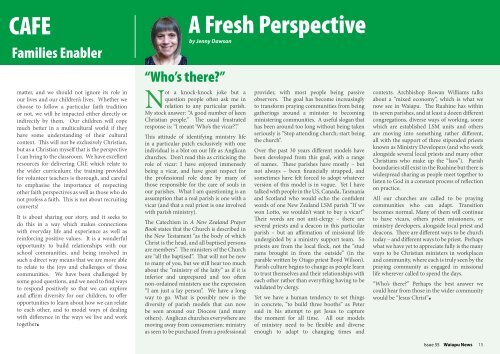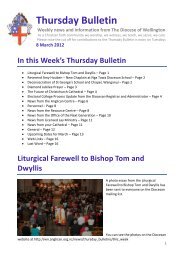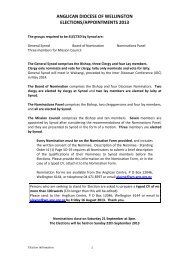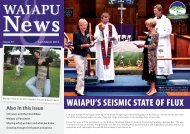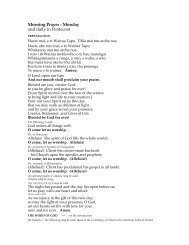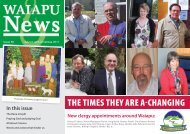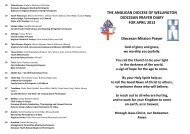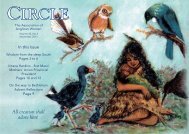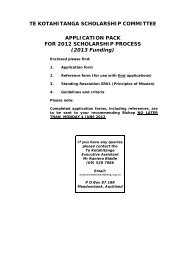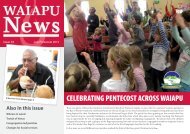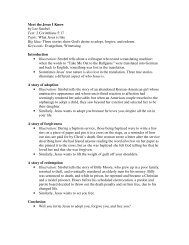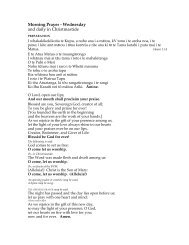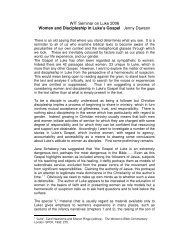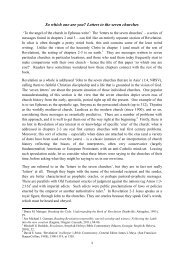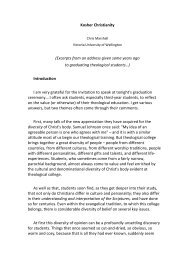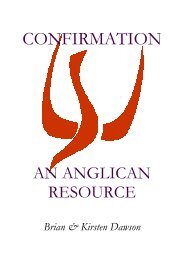ANGLICANS IN AOTEAROA - Waiapu Anglican Social Services
ANGLICANS IN AOTEAROA - Waiapu Anglican Social Services
ANGLICANS IN AOTEAROA - Waiapu Anglican Social Services
Create successful ePaper yourself
Turn your PDF publications into a flip-book with our unique Google optimized e-Paper software.
CAFE<br />
Families Enabler<br />
matter, and we should not ignore its role in<br />
our lives and our children’s lives. Whether we<br />
choose to follow a particular faith tradition<br />
or not, we will be impacted either directly or<br />
indirectly by them. Our children will cope<br />
much better in a multicultural world if they<br />
have some understanding of their cultural<br />
context. This will not be exclusively Christian,<br />
but as a Christian myself that is the perspective<br />
I can bring to the classroom. We have excellent<br />
resources for delivering CRE which relate to<br />
the wider curriculum; the training provided<br />
for volunteer teachers is thorough, and careful<br />
to emphasise the importance of respecting<br />
other faith perspectives as well as those who do<br />
not profess a faith. This is not about recruiting<br />
converts!<br />
It is about sharing our story, and it seeks to<br />
do this in a way which makes connections<br />
with everyday life and experience as well as<br />
reinforcing positive values. It is a wonderful<br />
opportunity to build relationships with our<br />
school communities, and being involved in<br />
such a direct way means that we are more able<br />
to relate to the joys and challenges of those<br />
communities. We have been challenged by<br />
some good questions, and we need to find ways<br />
to respond positively so that we can explore<br />
and affirm diversity for our children, to offer<br />
opportunities to learn about how we can relate<br />
to each other, and to model ways of dealing<br />
with difference in the ways we live and work<br />
together■<br />
“Who’s there?”<br />
A Fresh Perspective<br />
by Jenny Dawson<br />
Not a knock-knock joke but a<br />
question people often ask me in<br />
relation to any particular parish.<br />
My stock answer: “A good number of keen<br />
Christian people.” The usual frustrated<br />
response is: “I meant ‘Who’s the vicar?’.”<br />
This attitude of identifying ministry life<br />
in a particular patch exclusively with one<br />
individual is a blot on our life as <strong>Anglican</strong><br />
churches. Don’t read this as criticising the<br />
role of vicar: I have enjoyed immensely<br />
being a vicar, and have great respect for<br />
the professional role done by many of<br />
those responsible for the care of souls in<br />
our parishes. What I am questioning is an<br />
assumption that a real parish is one with a<br />
vicar (and that a real priest is one involved<br />
with parish ministry).<br />
The Catechism in A New Zealand Prayer<br />
Book states that the Church is described in<br />
the New Testament “as the body of which<br />
Christ is the head, and all baptised persons<br />
are members”. The ministers of the Church<br />
are “all the baptised”. That will not be new<br />
to many of you, but we still hear too much<br />
about the “ministry of the laity” as if it is<br />
inferior and unprepared and too often<br />
non-ordained ministers use the expression<br />
“I am just a lay person”. We have a long<br />
way to go. What is possibly new is the<br />
diversity of parish models that can now<br />
be seen around our Diocese (and many<br />
others). <strong>Anglican</strong> churches everywhere are<br />
moving away from consumerism: ministry<br />
as seen to be purchased from a professional<br />
provider, with most people being passive<br />
observers. The goal has become increasingly<br />
to transform praying communities from being<br />
gatherings around a minister to becoming<br />
ministering communities. A useful slogan that<br />
has been around too long without being taken<br />
seriously is “Stop attending church; start being<br />
the church”.<br />
Over the past 30 years different models have<br />
been developed from this goal, with a range<br />
of names. These parishes have mostly – but<br />
not always – been financially strapped, and<br />
sometimes have felt forced to adopt whatever<br />
version of this model is in vogue. Yet I have<br />
talked with people in the US, Canada, Tasmania<br />
and Scotland who would echo the confident<br />
words of one New Zealand LSM parish “If we<br />
won Lotto, we wouldn’t want to buy a vicar!”<br />
Their words are not anti-clergy – there are<br />
several priests and a deacon in this particular<br />
parish – but an affirmation of missional life<br />
undergirded by a ministry support team. So<br />
priests are from the local flock, not the “stud<br />
rams brought in from the outside” (in the<br />
parable written by Otago priest Boyd Wilson).<br />
Parish culture begins to change as people learn<br />
to trust themselves and their relationships with<br />
each other rather than everything having to be<br />
validated by clergy.<br />
Yet we have a human tendency to set things<br />
in concrete, “to build three booths” as Peter<br />
said in his attempt to get Jesus to capture<br />
the moment for all time. All our models<br />
of ministry need to be flexible and diverse<br />
enough to adapt to changing times and<br />
contexts. Archbishop Rowan Williams talks<br />
about a “mixed economy”, which is what we<br />
now see in <strong>Waiapu</strong>. The Ruahine has within<br />
its seven parishes, and at least a dozen different<br />
congregations, diverse ways of working, some<br />
which are established LSM units and others<br />
are moving into something rather different,<br />
all with the support of three stipended priests<br />
known as Ministry Developers (and who work<br />
alongside several local priests and many other<br />
Christians who make up the “laos”). Parish<br />
boundaries still exist in the Ruahine but there is<br />
widespread sharing as people meet together to<br />
listen to God in a constant process of reflection<br />
on practice.<br />
All our churches are called to be praying<br />
communities who can adapt. Transition<br />
becomes normal. Many of them will continue<br />
to have vicars, others priest missioners, or<br />
ministry developers, alongside local priest and<br />
deacons. There are different ways to be church<br />
today – and different ways to be priest. Perhaps<br />
what we have yet to appreciate fully is the many<br />
ways to be Christian ministers in workplaces<br />
and community, where each is truly seen by the<br />
praying community as engaged in missional<br />
life wherever called to spend the days.<br />
“Who’s there?” Perhaps the best answer we<br />
could hear from those in the wider community<br />
would be “Jesus Christ”■<br />
Issue 55 <strong>Waiapu</strong> News<br />
15


